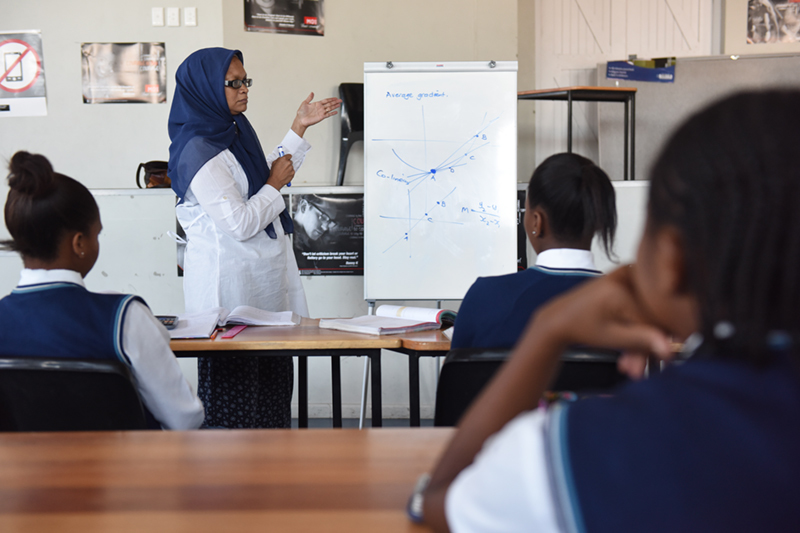COVID-19: Alternate-day schooling leads to significant learning gaps
27 September 2021 | Story Niémah Davids. Photo UCT News. Read time 8 min.
The new alternate‑day school arrangement, adopted by most public schools in South Africa at the onset of the COVID‑19 pandemic, fails to adequately prepare learners for the next grade and might result in considerable learning gaps in certain academic areas.
But all is not lost, said University of Cape Town (UCT) learning expert Associate Professor Joanne Hardman. Instead, teachers should make every effort to focus on core concepts like literacy and numeracy and should implement other beneficial interventions to help learners catch up on lost classroom time. But teachers can’t do it alone. They need collective buy‑in and commitment from parents and caregivers to get learners to where they need to be.
“Yes, children have lost quite a bit of learning time, but we should not be too quick to panic. We need to focus on other interventions to help them succeed in school,” Associate Professor Hardman said.
UCT News sat down with Hardman to learn more about the implications of lost classroom time for children in the long‑term. We also discussed the approaches teachers, parents and caregivers need to adopt to help learners cope with the curriculum and the new, indefinite, school arrangement.
Niémah Davids (ND): How much has the pandemic disrupted learning in schools in South Africa?
Joanne Hardman (JH): In the beginning (March 2020), experts realised that COVID‑19 and the subsequent shutdown would have an enormous impact on the curriculum. Because schools were closed for an extended period of time, government and education experts realised that it would be impossible to cover the full curriculum when learners returned to school after the hard lockdown, and as a result, the curriculum was trimmed.
The long‑term effects on this loss of learning time remain unknown, but we do know that with the new curriculum, children are acquiring less content. However, if we continue to cover the fundamental concepts in schools and really focus on them, we should be able to curtail this impact.
“If we continue to cover the fundamental concepts in schools and really focus on them, we should be able to curtail this impact.”
ND: Please highlight and explain those fundamental concepts that teachers need to focus on to help children cope with the academic load.
JH: Children need to be able to read for meaning and engage with numerical data. In addition, they also need to be able to classify, categorise, reflect, evaluate and produce appropriate answers to questions by means of weighing evidence. These concepts should come through in most subjects taught in school and need to be a key focus during this time.
ND: Because most public schools don’t have the infrastructure to accommodate learners at school and simultaneously adhere to social distancing guidelines, thousands of children now attend school every second day. What’s the impact of this arrangement?
JH: This model of attendance has been adopted in under‑resourced schools, which is sad because these disadvantaged schools are already hamstrung by their lack of material and human resources. Attending school every second day is not optimal at all. We haven’t been able to quantify the impact, but I would hypothesise that these losses in learning will be large and will require a concerted effort to fill the gaps.
“The consequences for younger children who are unable to read are far more serious.”
ND: Talk to us about the effects this arrangement will have on literacy and numeracy levels specifically.
JH: Learning online is easier for children over the age of eight because they are concrete, operational thinkers and can follow programmes that provide concrete instances when it comes to problem solving. These children are generally on the cusp of being able to read for meaning.
The consequences for younger children who are unable to read are far more serious. My opinion is that grade ones and twos will lag behind significantly in these core cognitive concepts if they don’t have a caregiver who works with them independently to [help them] learn to read and count.
ND: Talk to us about the interventions schools need to adopt to ensure that children catch up on lost classroom time.
JH: Extra teaching input is necessary, and this may necessitate after-hours and weekend teaching for children to catch up on lost time.
Significantly, the way to address the loss of content knowledge, and in some instances, the dearth of conceptual growth, requires a commitment to a pedagogy that works in collaboration with the child, and constructs knowledge and skills meaningful to the learner. This praxis is referred to as mediation and requires that a more skilled person (teacher or parent) is able to induct the learner into new ways of knowing. This is time‑consuming, but I feel that it’s crucial to close the gaps brought on by the pandemic.
ND: Can we take any reassurance from events in the past where children have lost learning time, but the effects weren’t as far-reaching?
JH: Absolutely. The Holocaust is one such example. We know from research that children who missed up to five years of schooling during this time did not fall behind significantly. Given the right opportunities, most Jewish children whose education had been severely interrupted by the [Second World War] were able to attain high-status jobs such as medical doctors and lawyers when they grew up.
ND: What are some of the lessons the sector has learned from the COVID‑19 pandemic?
JH: What we’ve learned in South Africa is that we need to design teaching and learning techniques that are not necessarily face‑to‑face and that can take place outside the classroom. This doesn’t mean that we need online teaching; unfortunately, we don’t have the infrastructure for that, and the majority of learners don’t have devices or the funds for data.
What this means is that the material taught in schools should be designed in such a manner that it shouldn’t require a teacher in order for children to learn. But instead, it should require that the material [has teaching built into it].
We should also make use of television programmes like Takalani Sesame which promotes the basics of the school curriculum including literacy, numeracy and life skills. This will help when face‑to‑face learning is not possible. This also means that we need to train teachers to develop their teaching material to build actual conceptual development into [it]. There is, of course, also a need to develop teachers’ skills with regard to teaching with technology.
“Teachers alone are not responsible for children’s conceptual development.”
ND: Will this new alternate‑day school arrangement deepen the divide between the haves and the have‑nots?
JH: We are aware that South Africa has the highest Gini coefficient (a gauge of economic inequality) in the world, making us the most unequal country on the planet. The impact of the COVID‑19 pandemic has added to this inequality because children who cannot learn online as a result of a lack of resources have been further disadvantaged when it comes to acquiring their education.
ND: Talk to us about any other approaches teachers and caregivers need to adopt to help learners cope with the curriculum and the new schooling arrangement.
JH: Teachers are going to have to be more involved in teaching than ever before. They will have to develop mechanisms where they are able to teach smaller groups, to ensure that they can reach each child. Caregivers too have a burden of care here. Teachers alone are not responsible for children’s conceptual development; caregivers need to set aside time to work through content and concepts with the children as well.
 This work is licensed under a Creative Commons Attribution-NoDerivatives 4.0 International License.
This work is licensed under a Creative Commons Attribution-NoDerivatives 4.0 International License.
Please view the republishing articles page for more information.
UCT’s response to COVID-19
COVID-19 is a global pandemic that caused President Cyril Ramaphosa to declare a national disaster in South Africa on 15 March 2020 and to implement a national lockdown from 26 March 2020. UCT is taking the threat of infection in our university community extremely seriously, and this page will be updated with the latest COVID-19 information. Please note that the information on this page is subject to change depending on current lockdown regulations.
Minister of Health, Dr Joe Phaahla, has in June 2022 repealed some of South Africa’s remaining COVID-19 regulations: namely, sections 16A, 16B and 16C of the Regulations Relating to the Surveillance and the Control of Notifiable Medical Conditions under the National Health Act. We are now no longer required to wear masks or limit gatherings. Venue restrictions and checks for travellers coming into South Africa have now also been removed.
Read the latest document available on the UCT policies web page.
Campus communications
2022
UCT Community of Hope Vaccination Centre
On Wednesday, 20 July, staff from the University of Cape Town’s (UCT) Faculty of Health Sciences came together with representatives from the Western Cape Government at the UCT Community of Hope Vaccination Centre at Forest Hill Residence to acknowledge the centre’s significance in the fight against COVID-19 and to thank its staff for their contributions. The centre opened on 1 September 2021 with the aim of providing quality vaccination services to UCT staff, students and the nearby communities, as well as to create an opportunity for medical students from the Faculty of Health Sciences to gain practical public health skills. The vaccination centre ceased operations on Friday, 29 July 2022.
With the closure of the UCT Community of Hope Vaccination Centre, if you still require access to a COVID-19 vaccination site please visit the CovidComms SA website to find an alternative.
“After almost a year of operation, the University of Cape Town’s (UCT) Community of Hope Vaccination Centre, located at the Forest Hill residence complex in Mowbray, will close on Friday, 29 July 2022. I am extremely grateful and proud of all staff, students and everyone involved in this important project.”
– Vice-Chancellor Prof Mamokgethi PhakengWith the closure of the UCT Community of Hope Vaccination Centre, if you still require access to a COVID-19 vaccination site please visit the CovidComms SA website to find an alternative.
Frequently asked questions
Global Citizen Asks: Are COVID-19 Vaccines Safe & Effective?
UCT’s Institute of Infectious Disease and Molecular Medicine (IDM) collaborated with Global Citizen, speaking to trusted experts to dispel vaccine misinformation.
If you have further questions about the COVID-19 vaccine check out the FAQ produced by the Desmond Tutu Health Foundation (DTHF). The DTHF has developed a dedicated chat function where you can ask your vaccine-related questions on the bottom right hand corner of the website.
IDM YouTube channel | IDM website
“As a contact university, we look forward to readjusting our undergraduate and postgraduate programmes in 2023 as the COVID-19 regulations have been repealed.”
– Prof Harsha Kathard, Acting Deputy Vice-Chancellor: Teaching and Learning
We are continuing to monitor the situation and we will be updating the UCT community regularly – as and when there are further updates. If you are concerned or need more information, students can contact the Student Wellness Service on 021 650 5620 or 021 650 1271 (after hours), while staff can contact 021 650 5685.




















